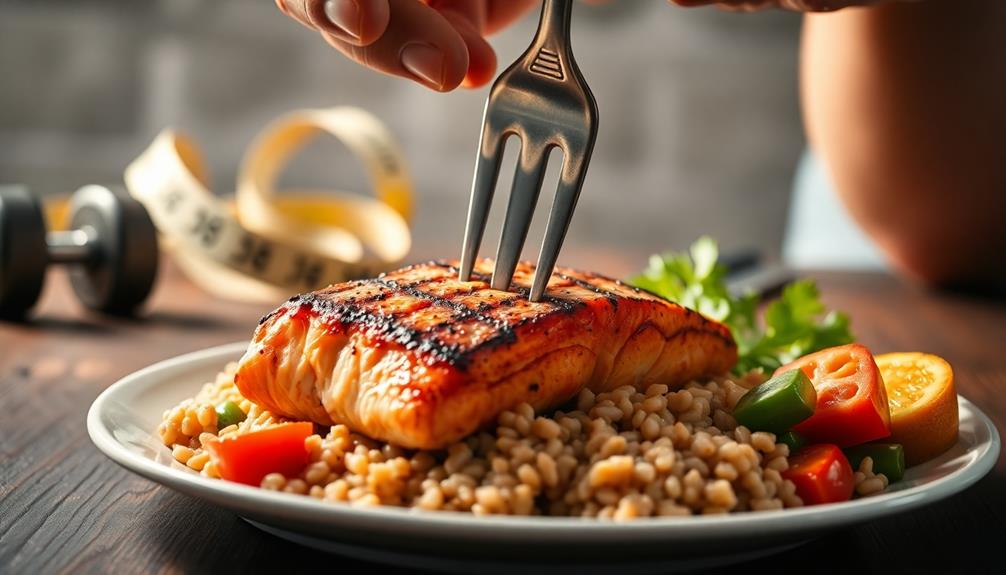Salmon is an excellent addition to your muscle-building diet. It's packed with high-quality protein, providing about 22 grams per 3-ounce serving, which is essential for muscle growth and repair. The omega-3 fatty acids in salmon help reduce inflammation and improve insulin sensitivity, supporting your bulking goals. It's also rich in essential micronutrients like selenium, vitamin D, and B vitamins, which aid in muscle recovery, function, and metabolism. Salmon's versatility makes it easy to incorporate into various meals, perfect for post-workout nutrition. Its combination of protein, healthy fats, and nutrients makes it an ideal food for both muscle growth and overall health. Let's explore how to maximize salmon's benefits in your diet.
Core Insight
- Salmon provides 22 grams of complete protein per 3-ounce serving, crucial for muscle building and repair.
- Omega-3 fatty acids in salmon reduce inflammation and improve insulin sensitivity, supporting muscle growth.
- Micronutrients like selenium, vitamin D, and B vitamins aid muscle recovery, function, and metabolism.
- Salmon's versatility allows for varied meal planning options, balancing protein, healthy fats, and complex carbs.
- The combination of protein and omega-3s in salmon supports post-workout recovery and reduces muscle soreness.
Protein-Packed Muscle Builder
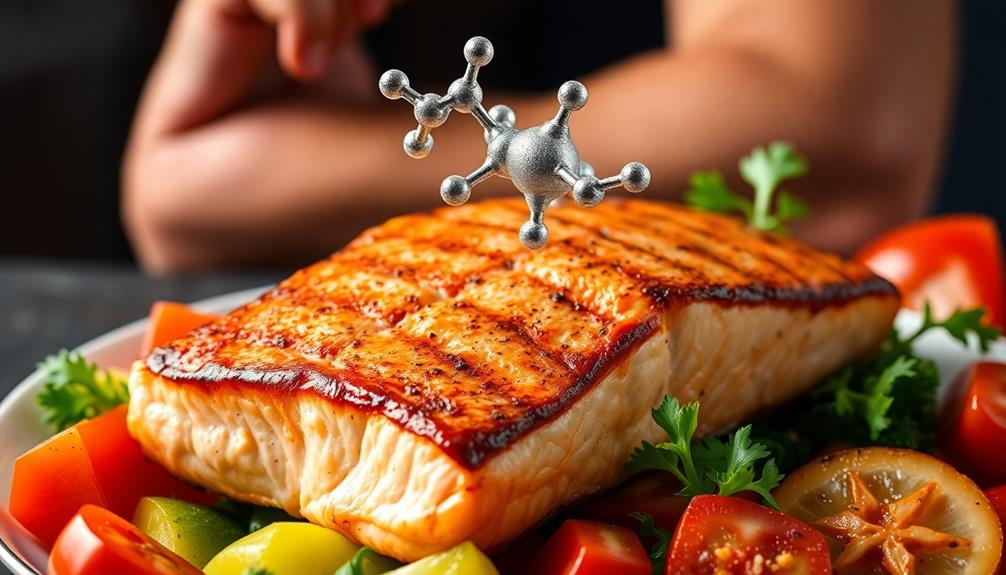
Salmon packs a protein punch, giving you about 22 grams in a 3-ounce serving. Protein is crucial for building and repairing muscle, so salmon is perfect when you're trying to bulk up. Just like whey protein powders, salmon gives you a lot of protein per serving. But it's a whole food that also provides other nutritional benefits.
Salmon's protein is special because it's complete, which means it has all nine essential amino acids. Your body can't make these on its own, and they're important for growing new muscle after your workouts.
Plus, your body can easily use the protein in salmon. This makes salmon a great choice for helping you reach your muscle-building goals. It can help you recover faster and get stronger.
Essential Fatty Acids Benefits
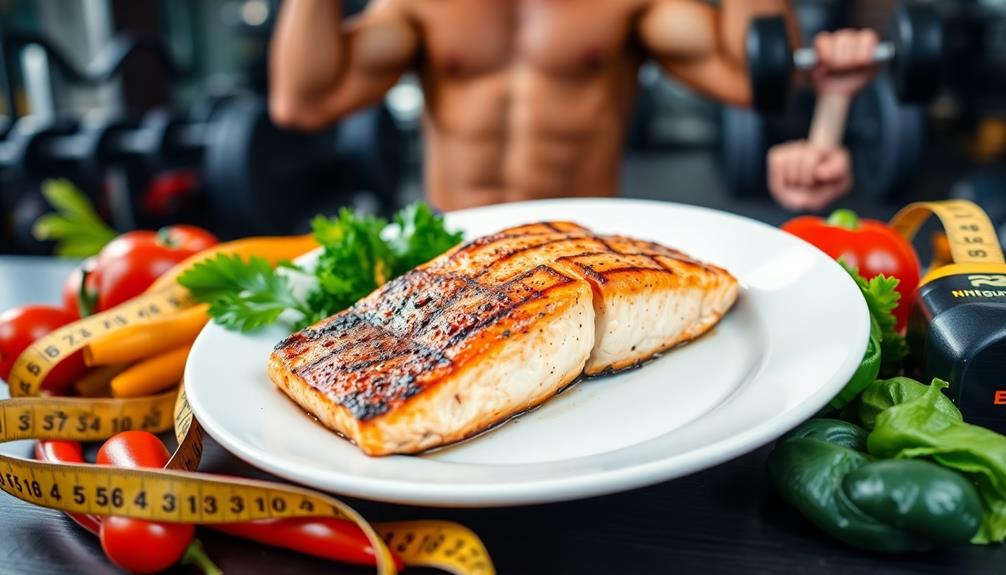
Salmon is a great source of omega-3 fatty acids, which are essential for building muscle. Omega-3s help reduce inflammation, allowing you to recover faster after tough workouts. They also improve your body's ability to use nutrients efficiently by increasing insulin sensitivity. Combining omega-3s with CLA supplements can boost fat-burning effects, helping you achieve your muscle-building goals.
Adding salmon to your diet is beneficial for both muscle growth and overall health. The fatty acids in salmon support heart health, brain function, and may even increase muscle protein synthesis when combined with resistance training. By eating salmon regularly, you'll be fueling your muscles and taking care of your body's long-term health and performance. It's a great choice for anyone looking to build muscle and maintain overall well-being.
Micronutrients for Muscle Growth

Salmon is an excellent choice for muscle growth because it contains important micronutrients in addition to protein and essential fatty acids. Selenium in salmon helps your muscles recover and protects against damage from stress. Vitamin D is important for muscle function and strength, and eating salmon with some fat helps your body absorb more of it. B vitamins, especially B12, help turn food into energy and support muscle metabolism. Potassium in salmon aids muscle contraction and nerve signaling, while magnesium helps regulate muscle and nerve function. Zinc supports protein synthesis and hormone production, which are both necessary for muscle growth. By eating salmon, you get a variety of micronutrients that work together to help you build muscle more effectively.
Versatile Meal Planning Options
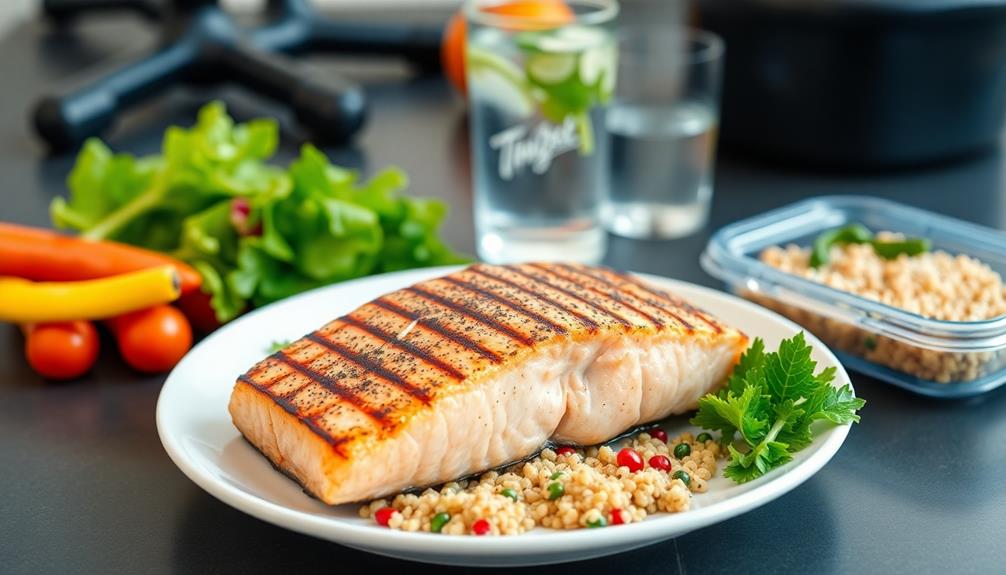
Salmon is a great choice for meal planning because it's so versatile. You can cook it in many ways to fit your tastes and dietary needs. Consider these three easy options:
- Grilled salmon with roasted veggies on the side
- Salmon salad with mixed greens and a light dressing
- Baked salmon with quinoa and steamed broccoli
These meals give you a good balance of protein, healthy fats, and complex carbs. Salmon is easy to prep ahead for quick lunches or dinners during the week. It's also perfect for post-workout meals since it has lots of protein and omega-3s that help muscles recover. Feel free to try different seasonings and cooking methods to keep things interesting. Staying consistent is the most important thing for building muscle, and salmon's versatility makes it easier to stick with your nutrition plan.
Recovery and Inflammation Support
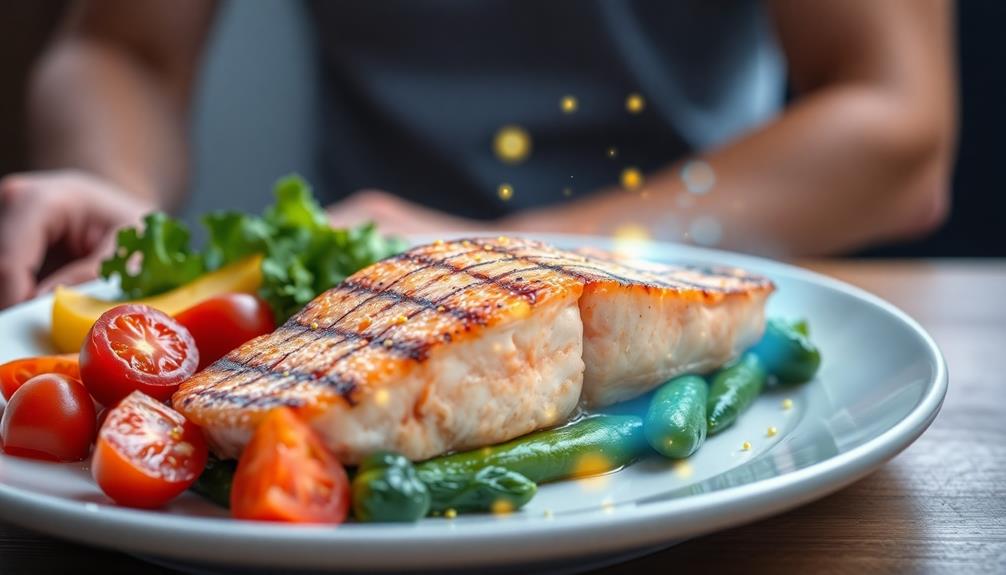
Salmon is a great food to help you recover after a workout. It has nutrients that can reduce inflammation and soreness in your muscles. The omega-3 fatty acids in salmon are especially good at fighting inflammation. Salmon also has high-quality protein, which helps repair your muscles. Other nutrients like vitamin D and selenium support your immune system and act as antioxidants.
Here's a simple table showing how salmon aids recovery:
Nutrient | Benefit for Recovery
— | —
Omega-3 fatty acids | Reduces inflammation
High-quality protein | Helps repair muscles
Vitamin D | Supports immune system
Selenium | Acts as an antioxidant
Frequently Asked Questions
How Much Salmon Should I Eat per Week for Optimal Muscle Gain?
You should aim for 2-3 servings of salmon per week, each about 3-4 ounces. This'll provide you with ample protein and omega-3 fatty acids to support muscle growth. Don't forget to balance it with other protein sources.
Can Canned Salmon Provide the Same Muscle-Building Benefits as Fresh Salmon?
Yes, canned salmon can provide similar muscle-building benefits as fresh salmon. You'll get high-quality protein, omega-3 fatty acids, and essential nutrients. It's a convenient and cost-effective option for your muscle-building diet. Just watch for added sodium.
Is Farmed Salmon as Effective for Bulking as Wild-Caught Salmon?
While both can support your bulking goals, wild-caught salmon's typically higher omega-3 content and better protein-to-fat ratio make it slightly more effective. However, farmed salmon's still a great option if it's more accessible or affordable for you.
Are There Any Potential Side Effects of Consuming Too Much Salmon?
Yes, you can experience side effects from eating too much salmon. You'll risk mercury poisoning, excessive vitamin A intake, and potential antibiotic exposure from farmed salmon. It's also high in calories, which may lead to weight gain.
How Does Salmon Compare to Other Fish for Muscle-Building Purposes?
You'll find salmon's an excellent muscle-building fish. It's high in protein and omega-3s, outperforming many other fish. However, tuna and cod are also great options, offering lean protein for your gains. Mix it up for best results.

